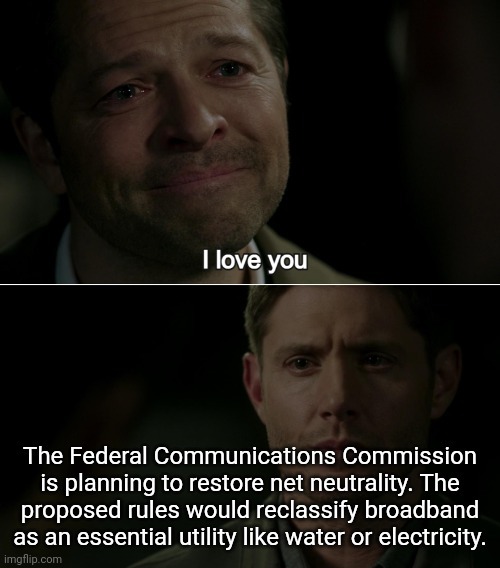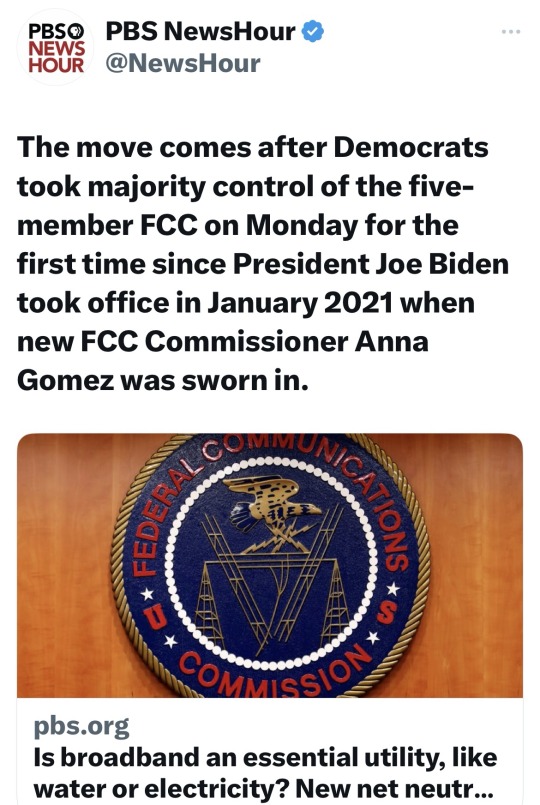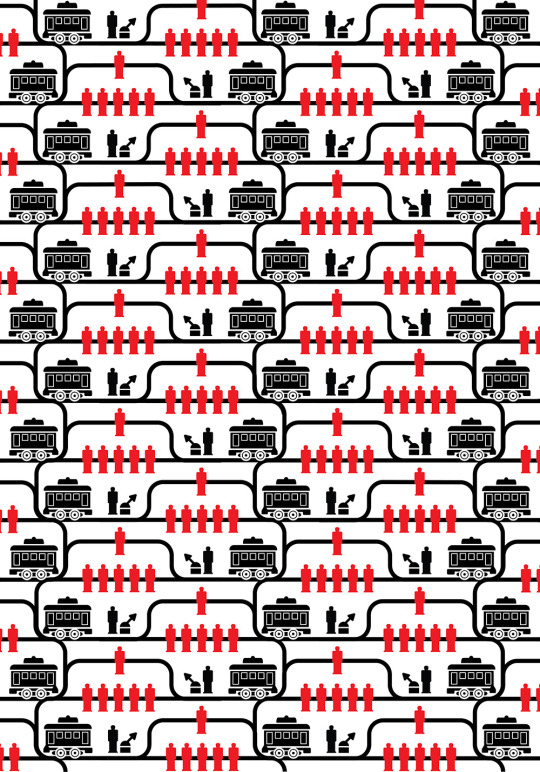#broadband
Text

source 1
source 2
#destiel meme#destiel meme news#united states#us news#news#net neutrality#internet#broadband#fcc#federal communications commission
99K notes
·
View notes
Text

3K notes
·
View notes
Text














userbars for forum signatures from userbars.org (RIP)
#webcore#old web#web archive#internet archive#internet archaeology#internet art#forum#forums#internet#computer#broadband#gimp#firefox#limewire#paint#ms paint#php#php programming#archive.org#skype#internet explorer#winamp#ventrillo#windows xp#userbars#forum signature#deep internet#internet exploration#old internet#y2kcore
491 notes
·
View notes
Text
This is bringing back net neutrality. This is good regulation that helps ordinary people. Don't let them spin you.
137 notes
·
View notes
Text
I invite everyone to choose forgiveness rather than division, teamwork over personal ambition.
#united states#usa#united states of america#america#migration#americans#refugees#destiel meme#destiel meme news#us news#news#net neutrality#internet#broadband#fcc#federal communications commission#genshin#genshin impact fanart#genshin fanart#fontaine#genshin art#childe#genshin impact
75 notes
·
View notes
Text
Linkty Dumpty

I was supposed to be on vacation, and while I didn’t do any blogging for a month, that didn’t mean that I stopped looking at my distraction rectangle and making a list of things I wanted to write about. Consequentially, the link backlog is massive, so it’s time to declare bankruptcy with another linkdump:
https://pluralistic.net/tag/linkdump/

[Image ID: John Holbo’s ‘trolley problem’ art, a repeating pattern of trolleys, tracks, people on tracks, and people standing at track switches]++
Let’s kick things off with a little graphic whimsy. You’ve doubtless seen the endless Trolley Problem memes, working from the same crude line drawings? Well, philosopher John Holbo got tired of that artwork, and he whomped up a fantastic alternative, which you can get as a poster, duvet, sticker, tee, etc:
https://www.redbubble.com/shop/ap/145078097
The trolley problem has been with us since 1967, but it’s enjoying a renaissance thanks to the insistence of “AI” weirdos that it is very relevant to our AI debate. A few years back, you could impress uninformed people by dropping the Trolley Problem into a discussion:
https://memex.craphound.com/2016/10/25/mercedes-weird-trolley-problem-announcement-continues-dumb-debate-about-self-driving-cars/
Amazingly, the “AI” debate has only gotten more tedious since the middle of the past decade. But every now and again, someone gets a stochastic parrot to do something genuinely delightful, like the Jolly Roger Telephone Company, who sell chatbots that will pretend to be tantalyzingly confused marks in order to tie up telemarketers and waste their time:
https://jollyrogertelephone.com/
Jolly Roger sells different personas: “Whitebeard” is a confused senior who keeps asking the caller’s name, drops nonsequiturs into the conversation, and can’t remember how many credit-cards he has. “Salty Sally” is a single mom with a houseful of screaming, demanding children who keep distracting her every time the con artist is on the verge of getting her to give up compromising data. “Whiskey Jack” is drunk:
https://www.wsj.com/articles/people-hire-phone-bots-to-torture-telemarketers-2dbb8457
The bots take a couple minutes to get the sense of the conversation going. During that initial lag, they have a bunch of stock responses like “there’s a bee on my arm, but keep going,” or grunts like “huh,” and “uh-huh.” The bots can keep telemarketers and scammers on the line for quite a long time. Scambaiting is an old and honorable vocation, and it’s good that it has received a massive productivity gain from automation. This is the AI Dividend I dream of.
The less-fun AI debate is the one over artists’ rights and tech. I am foresquare for the artists here, but I think that the preferred solutions (like creating a new copyright over the right to train a model with your work) will not lead to the hoped-for outcome. As with other copyright expansions — 40 years’ worth of them now — this right will be immediately transferred to the highly concentrated media sector, who will simply amend their standard, non-negotiable contracting terms to require that “training rights” be irrevocably assigned to them as a condition of working.
The real solution isn’t to treat artists as atomic individuals — LLCs with an MFA — who bargain, business-to-business, with corporations. Rather, the solutions are in collective power, like unions. You’ve probably heard about the SAG-AFTRA actors’ strike, in which creative workers are bargaining as a group to demand fair treatment in an age of generative models. SAG-AFTRA president Fran Drescher’s speech announcing the strike made me want to stand up and salute:
https://www.youtube.com/watch?v=J4SAPOX7R5M
The actors’ strike is historic: it marks the first time actors have struck since 2000, and it’s the first time actors and writers have co-struck since 1960. Of course, writers in the Writers Guild of America (West and East) have been picketing since since April, and one of their best spokespeople has been Adam Conover, a WGA board member who serves on the negotiating committee. Conover is best known for his stellar Adam Ruins Everything comedy-explainer TV show, which pioneered a technique for breaking down complex forms of corporate fuckery and making you laugh while he does it. Small wonder that he’s been so effective at conveying the strike issues while he pickets.
Writing for Jacobin, Alex N Press profiles Conover and interviews him about the strike, under the excellent headline, “Adam Pickets Everything.” Conover is characteristically funny, smart, and incisive — do read:
https://jacobin.com/2023/07/adam-conover-wga-strike
Of course, not everyone in Hollywood is striking. In late June, the DGA accepted a studio deal with an anemic 41% vote turnout:
https://www.theverge.com/2023/6/26/23773926/dga-amptp-new-deal-strike
They probably shouldn’t have. In this interview with The American Prospect’s Peter Hong, the brilliant documentary director Amy Ziering breaks down how Netflix and the other streamers have rugged documentarians in a classic enshittification ploy that lured in filmmakers, extracted everything they had, and then discarded the husks:
https://prospect.org/culture/2023-06-21-drowned-in-the-stream/
Now, the streaming cartel stands poised to all but kill off documentary filmmaking. Pressured by Wall Street to drive high returns, they’ve become ultraconservative in their editorial decisions, making programs and films that are as similar as possible to existing successes, that are unchallenging, and that are cheap. We’ve gone directly from a golden age of docs to a dark age.
In a time of monopolies, it’s tempting to form countermonopolies to keep them in check. Yesterday, I wrote about why the FTC and Lina Khan were right to try to block the Microsoft/Activision merger, and I heard from a lot of people saying this merger was the only way to check Sony’s reign of terror over video games:
https://pluralistic.net/2023/07/14/making-good-trouble/#the-peoples-champion
But replacing one monopolist with another isn’t good for anyone (except the monopolists’ shareholders). If we want audiences and workers — and society — to benefit, we have to de-monopolize the sector. Last month, I published a series with EFF about how we should save the news from Big Tech:
https://www.eff.org/deeplinks/2023/04/saving-news-big-tech
After that came out, the EU Observer asked me to write up version of it with direct reference to the EU, where there are a lot of (in my opinion, ill-conceived but well-intentioned) efforts to pry Big Tech’s boot off the news media’s face. I’m really happy with how it came out, and the header graphic is awesome:
https://euobserver.com/opinion/157187
De-monopolizing tech has become my life’s work, both because tech is foundational (tech is how we organize to fight over labor, gender and race equality, and climate justice), and because tech has all of these technical aspects, which open up new avenues for shrinking Big Tech, without waiting decades for traditional antitrust breakups to run their course (we need these too, though!).
I’ve written a book laying out a shovel-ready plan to give tech back to its users through interoperability, explaining how to make new regulations (and reform old ones), what they should say, how to enforce them, and how to detect and stop cheating. It’s called “The Internet Con: How To Seize the Means of Computation” and it’s coming from Verso Books this September:
https://www.versobooks.com/products/3035-the-internet-con

[Image ID: The cover of the Verso Books hardcover of ‘The Internet Con: How to Seize the Means of Computation]
I just got my first copy in the mail yesterday, and it’s a gorgeous little package. The timing was great, because I spent the whole week in the studio at Skyboat Media recording the audiobook — the first audiobook of mine that I’ve narrated. It was a fantastic experience, and I’ll be launching a Kickstarter to presell the DRM-free audio and ebooks as well as hardcovers, in a couple weeks.
Though I like doing these crowdfunders, I do them because I have to. Amazon’s Audible division, the monopolist that controls >90% of the audiobook market, refuses to carry my work because it is DRM-free. When you buy a DRM-free audiobook, that means that you can play it on anyone’s app, not just Amazon’s. Every audiobook you’ve ever bought from Audible will disappear the moment you decide to break up with Amazon, which means that Amazon can absolutely screw authors and audiobook publishers because they’ve taken our customers hostage.
If you are unwise enough to pursue an MBA, you will learn a term of art for this kind of market structure: it’s a “moat,” that is, an element of the market that makes it hard for new firms to enter the market and compete with you. Warren Buffett pioneered the use of this term, and now it’s all but mandatory for anyone launching a business or new product to explain where their moat will come from.
As Dan Davies writes, these “moats” aren’t really moats in the Buffett sense. With Coke and Disney, he says, a “moat” was “the fact that nobody else could make such a great product that everyone wanted.” In other words, “making a good product,” is a great moat:
https://backofmind.substack.com/p/stuck-in-the-moat
But making a good product is a lot of work and not everyone is capable of it. Instead, “moat” now just means some form of lock in. Davies counsels us to replace “moat” with:
our subscription system and proprietary interface mean that our return on capital is protected by a strong Berlin Wall, preventing our customers from getting out to a freer society and forcing them to consume our inferior products for lack of alternative.
I really like this. It pairs well with my 2020 observation that the fight over whether “IP” is a meaningful term can be settled by recognizing that IP has a precise meaning in business: “Any policy that lets me reach beyond the walls of my firm to control the conduct of my competitors, critics and customers”:
https://locusmag.com/2020/09/cory-doctorow-ip/
To see how that works in the real world, check out “The Anti-Ownership Ebook Economy,” a magisterial piece of scholarship from Sarah Lamdan, Jason M. Schultz, Michael Weinberg and Claire Woodcock:
https://www.nyuengelberg.org/outputs/the-anti-ownership-ebook-economy/
Something happened when we shifted to digital formats that created a loss of rights for readers. Pulling back the curtain on the evolution of ebooks offers some clarity to how the shift to digital left ownership behind in the analog world.
The research methodology combines both anonymous and named sources in publishing, bookselling and librarianship, as well as expert legal and economic analysis. This is an eminently readable, extremely smart, and really useful contribution to the scholarship on how “IP” (in the modern sense) has transformed books from something you own to something that you can never own.
The truth is, capitalists hate capitalism. Inevitably, the kind of person who presides over a giant corporation and wields power over millions of lives — workers, suppliers and customers — believes themselves to be uniquely and supremely qualified to be a wise dictator. For this kind of person, competition is “wasteful” and distracts them from the important business of making everyone’s life better by handing down unilateral — but wise and clever — edits. Think of Peter Thiel’s maxim, “competition is for losers.”
That’s why giant companies love to merge with each other, and buy out nascent competitors. By rolling up the power to decide how you and I and everyone else live our lives, these executives ensure that they can help us little people live the best lives possible. The traditional role of antitrust enforcement is to prevent this from happening, countering the delusions of would-be life-tenured autocrats of trade with public accountability and enforcement:
https://marker.medium.com/we-should-not-endure-a-king-dfef34628153
Of course, for 40 years, we’ve had neoliberal, Reaganomics-poisoned antitrust, where monopolies are celebrated as “efficient” and their leaders exalted as geniuses whose commercial empires are evidence of merit, not savagery. That era is, thankfully, coming to an end, and not a moment too soon.
Leading the fight is the aforementioned FTC chair Lina Khan, who is taking huge swings at even bigger mergers. But the EU is no slouch in this department: they’re challenging the Adobe/Figma merger, a $20b transaction that is obviously and solely designed to recapture customers who left Adobe because they didn’t want to struggle under its yoke any longer:
https://gizmodo.com/adobe-figma-acquisition-likely-to-face-eu-investigation-1850555562
For autocrats of trade, this is an intolerable act of disloyalty. We owe them our fealty and subservience, because they are self-evidently better at understanding what we need than we could ever be. This unwarranted self-confidence from the ordinary mediocrities who end up running giant tech companies gets them into a whole lot of hot water.
One keen observer of the mind-palaces that tech leaders trap themselves in is Anil Dash, who describes the conspiratorial, far-right turn of the most powerful men (almost all men!) in Silicon Valley in a piece called “‘VC Qanon’ and the radicalization of the tech tycoons”:
https://www.anildash.com/2023/07/07/vc-qanon/
Dash builds on an editorial he published in Feb, “The tech tycoon martyrdom charade,” which explores the sense of victimhood the most powerful, wealthiest people in the Valley project:
https://www.anildash.com/2023/02/27/tycoon-martyrdom-charade/
These dudes are prisoners of their Great Man myth, and leads them badly astray. And while all of us are prone to lapses in judgment and discernment, Dash makes the case that tech leaders are especially prone to it:
Nobody becomes a billionaire by accident. You have to have wanted that level of power, control and wealth more than you wanted anything else in your life. They all sacrifice family, relationships, stability, community, connection, and belonging in service of keeping score on a scale that actually yields no additional real-world benefits on the path from that first $100 million to the tens of billions.
This makes billionaires “a cohort that is, counterintutively, very easily manipulated.” What’s more, they’re all master manipulators, and they all hang out with each other, which means that when a conspiratorial belief takes root in one billionaire’s brain, it spreads to the rest of them like wildfire.
Then, billionaires “push each other further and further into extreme ideas because their entire careers have been predicated on the idea that they’re genius outliers who can see things others can’t, and that their wealth is a reward for that imagined merit.”
They live in privileged bubbles, which insulates them from disconfirming evidence — ironic, given how many of these bros think they are wise senators in the agora.
There are examples of billionaires’ folly all around us today, of course. Take privacy: the idea that we can — we should — we must — spy on everyone, all the time, in every way, to eke out tiny gains in ad performance is objectively batshit. And yet, wealthy people decreed this should be so, and it was, and made them far richer.
Leaked data from Microsoft’s Xandr ad-targeting database reveals how the commercial surveillance delusion led us to a bizarre and terrible place, as reported on by The Markup:
https://themarkup.org/privacy/2023/06/08/from-heavy-purchasers-of-pregnancy-tests-to-the-depression-prone-we-found-650000-ways-advertisers-label-you
The Markup’s report lets you plumb 650,000 targeting categories, searching by keyword or loading random sets, 20 at a time. Do you want to target gambling addicts, people taking depression meds or Jews? Xandr’s got you covered. What could possibly go wrong?
The Xandr files come from German security researcher Wolfie Christl from Cracked Labs. Christi is a European, and he’s working with the German digital rights group Netzpolitik to get the EU to scrutinize all the ways that Xandr is flouting EU privacy laws.
Billionaires’ big ideas lead us astray in more tangible ways, of course. Writing in The Conversation, John Quiggin asks us to take a hard look at the much ballyhooed (and expensively ballyhooed) “nuclear renaissance”:
https://theconversation.com/dutton-wants-australia-to-join-the-nuclear-renaissance-but-this-dream-has-failed-before-209584
Despite the rhetoric, nukes aren’t cheap, and they aren’t coming back. Georgia’s new nuclear power is behind schedule and over budget, but it’s still better off than South Carolina’s nukes, which were so over budget that they were abandoned in 2017. France’s nuke is a decade behind schedule. Finland’s opened this year — 14 years late. The UK’s Hinkley Point C reactor is massively behind schedule and over budget (and when it’s done, it will be owned by the French government!).
China’s nuclear success story also doesn’t hold up to scrutiny — they’ve brought 50GW of nukes online, sure, but they’re building 95–120GW of solar every year.
Solar is the clear winner here, along with other renewables, which are plummeting in cost (while nukes soar) and are accelerating in deployments (while nukes are plagued with ever-worsening delays).
This is the second nuclear renaissance — the last one, 20 years ago, was a bust, and that was before renewables got cheap, reliable and easy to manufacture and deploy. You’ll hear fairy-tales about how the early 2000s bust was caused by political headwinds, but that’s simply untrue: there were almost no anti-nuke marches then, and governments were scrambling to figure out low-carbon alternatives to fossil fuels (this was before the latest round of fossil fuel sabotage).
The current renaissance is also doomed. Yes, new reactors are smaller and safer and won’t have the problems intrinsic to all megaprojects, but designs like VOYGR have virtually no signed deals. Even if they do get built, their capacity will be dwarfed by renewables — a Gen III nuke will generate 710MW of power. Globally, we add that much solar every single day.
And solar power is cheap. Even after US subsidies, a Gen III reactor would charge A$132/MWh — current prices are as low as A$64-$114/MWh.
Nukes are getting a charm offensive because wealthy people are investing in hype as a way of reaping profits — not as a way of generating safe, cheap, reliable energy.
Here in the latest stage of capitalism, value and profit are fully decoupled. Monopolists are shifting more and more value from suppliers and customers to their shareholders every day. And when the customer is the government, the depravity knows no bounds. In Responsible Statecraft, Connor Echols describes how military contractors like Boeing are able to bill the Pentagon $52,000 for a trash can:
https://responsiblestatecraft.org/2023/06/20/the-pentagons-52000-trash-can/
Military Beltway Bandits are nothing new, of course, but they’ve gotten far more virulent since the Obama era, when Obama’s DoD demanded that the primary contractors merge to a bare handful of giant firms, in the name of “efficiency.” As David Dayen writes in his must-read 2020 book Monopolized, this opened the door to a new kind of predator:
https://pluralistic.net/2021/01/29/fractal-bullshit/#dayenu
The Obama defense rollups were quickly followed by another wave of rollups, these ones driven by Private Equity firms who cataloged which subcontractors were “sole suppliers” of components used by the big guys. These companies were all acquired by PE funds, who then lowered the price of their products, selling them below cost.
This maximized the use of those parts in weapons and aircraft sold by primary contractors like Boeing, which created a durable, long-lasting demand for fresh parts for DoD maintenance of its materiel. PE-owned suppliers hits Uncle Sucker with multi-thousand-percent markups for these parts, which have now wormed their way into every corner of the US arsenal.
Yes, this is infuriating as hell, but it’s also so grotesquely wrong that it’s impossible to defend, as we see in this hilarious clip of Rep Katie Porter grilling witnesses on US military waste:
https://www.youtube.com/watch?v=TJhf6l1nB9A
Porter pulls out the best version yet of her infamous white-board and makes her witnesses play defense ripoff Jepoardy!, providing answers to a series of indefensible practices.
It’s sure nice when our government does something for us, isn’t it? We absolutely can have nice things, and we’re about to get them. The Infrastructure Bill contains $42B in subsidies for fiber rollouts across the country, which will be given to states to spend. Ars Technica’s Jon Brodkin breaks down the state-by-state spending:
https://arstechnica.com/tech-policy/2023/06/us-allocates-42b-in-broadband-funding-find-out-how-much-your-state-will-get/
Texas will get $3.31B, California will get $1.86B, and 17 other states will get $1B or more. As the White House announcement put it, “High-speed Internet is no longer a luxury.”
To understand how radical this is, you need to know that for decades, the cable and telco sector has grabbed billions in subsidies for rural and underserved communities, and then either stole the money outright, or wasted it building copper networks that run at a fraction of a percent of fiber speeds.
This is how America — the birthplace of the internet — ended up with some of the world’s slowest, most expensive broadband, even after handing out tens of billions of dollars in subsidies. Those subsidies were gobbled up by greedy, awful phone companies — these ones must be spent wisely, on long-lasting, long-overdue fiber infrastructure.
That’s a good note to end on, but I’ve got an even better one: birds in the Netherlands are tearing apart anti-bird strips and using them to build their nests. Wonderful creatures 1, hostile architecture, 0. Nature is healing:
https://www.theguardian.com/science/2023/jul/11/crows-and-magpies-show-their-metal-by-using-anti-bird-spikes-to-build-nests

If you'd like an essay-formatted version of this thread to read or share, here's a link to it on pluralistic.net, my surveillance-free, ad-free, tracker-free blog:
https://pluralistic.net/2023/07/15/in-the-dumps/#what-vacation

Next Tues, Jul 18, I'm hosting the first Clarion Summer Write-In Series, an hour-long, free drop-in group writing and discussion session. It's in support of the Clarion SF/F writing workshop's fundraiser to offer tuition support to students:
https://mailchi.mp/theclarionfoundation/clarion-write-ins

[Image iD: A dump-truck, dumping out a load of gravel. A caricature of Humpty Dumpty clings to its lip, restrained by a group of straining, Lilliputian men.]
#pluralistic#infrastructure#broadband#linkdumps#fran drescher#labor#strikes#libraries#big tech#sag aftra#writer's strike#commercial surveillance#actor's strike#data brokers#ebooks#moats and walls#drm#licensing#glam#publishing#military privacy#copyfight#platform economics#nukes#adam conover#pentagon#birds#mergers#delightful creatures#hostile architecture
114 notes
·
View notes
Text
House GOP seeks billions in cuts to rail, water infrastructure spending
Two years after approving a bipartisan $1.2 trillion law, Republicans are looking to scale back spending that some in their own party previously supported
By Tony Romm and Ian Duncan
Updated July 18, 2023 at 12:12 p.m. EDT|Published July 18, 2023 at 6:00 a.m. EDT
It took decades for Congress to deliver on its promise to pour new money into the nation’s roads, bridges, pipes, ports and internet connections.
Now, House Republicans are trying to slash some of the same funds.
A series of GOP bills to finance the federal government in 2024 would wipe out billions of dollars meant to repair the nation’s aging infrastructure, potentially undercutting a 2021 law that was one of Washington’s rare recent bipartisan achievements. The proposed cuts could hamstring some of the most urgently needed public-works projects across the country, from improving rail safety to reducing lead contamination at schools.
Some of the cuts would be particularly steep: Amtrak, for example, could lose nearly two-thirds of its annual federal funding next fiscal year if House Republicans prevail. That includes more than $1 billion in cuts targeting the highly trafficked and rapidly aging Northeast Corridor, which runs between Boston and Washington, prompting Amtrak’s chief to sound early alarms about service disruptions.
In recent days, Republicans have defended their approach as a fiscally responsible way to reduce the burgeoning federal debt. They’ve largely tried to extract the savings by slimming down federal agencies’ operating budgets next year, technically leaving intact the extra funding that lawmakers adopted in the bipartisan Infrastructure Investment and Jobs Act.
But the effect would be the same: The GOP bills would reduce the federal money available for repairs. The cuts would come at a time when the country is grappling with the real-life consequences of its own infrastructure failures, from train derailments in Ohio and Pennsylvania to the collapse of a key portion of Interstate 95 in Philadelphia last month.
“I guess no one reads newspapers,” said Rep. Mike Quigley of Illinois, the top Democrat on the appropriations panel that oversees transportation and other key infrastructure programs. “When big infrastructure issues are blowing up in our face, we’re doing the opposite.”
They opposed the infrastructure law. Now, some in the GOP court its cash.
The emerging House battle underscores the massive chasm between Democrats and Republicans over the nation’s fiscal health, only weeks after the two parties brokered what was thought to be a political truce.
In a deal to stave off a potential first-ever federal default, Biden worked out an agreement with House Speaker Kevin McCarthy (R-Calif.) in June to pursue modest voluntary spending caps on federal agencies and programs starting in the 2024 fiscal year. In exchange, Republicans permitted lawmakers to raise the debt ceiling, allowing the United States to resume borrowing money to pay its bills.
Even as Republicans touted that vote as a victory, however, some in the party’s far-right flank signaled they planned to continue the fight. They pledged to force Democrats to accept massive spending cuts through the annual appropriations process that funds the government — or risk a shutdown if lawmakers fail to act by the Sept. 30 deadline.
So far, the standoff has largely simmered behind the scenes. In recent weeks, Rep. Kay Granger (R-Tex.), the chairwoman of the House Appropriations Committee, has worked methodically to process a dozen funding bills, which McCarthy on Monday said he hopes to start bringing to the chamber floor as soon as next week.
In a sign of the acrimonious debate to come, each of the House appropriations bills features sharp spending cuts that Democrats vehemently oppose — even targeting some federal infrastructure programs that until recently had enjoyed bipartisan support.
Two years after Congress approved $55 billion to improve the nation’s water supply, for example, House Republicans last week proposed to eliminate $1.7 billion from the two primary federal sources for drinking water and wastewater grants to states.
Those programs had received supplemental funding as part of the bipartisan infrastructure act. Rather than undo that law, the GOP bill would dramatically reduce the initiatives’ annual budgets, compared with what they received in the 2023 fiscal year, while underfunding a slew of other federal water infrastructure operations. That includes two programs to help schools and low-income communities reduce lead contamination, which together could receive about $85 million less next year than lawmakers previously had authorized, according to an analysis of data released in January 2022 by the Congressional Research Service.
“I’ll be real honest with you: If you’re looking for a pretty bill, this is not it,” acknowledged Rep. Mike Simpson (R-Idaho), the chairman of the appropriations subcommittee that produced the proposal, at a hearing last week.
“Cutting funding is never easy and can often be an ugly process. … But with the nation’s debt in excess of $32 trillion and inflation at an unacceptable level, we have to do our jobs to rein in unnecessary federal spending,” he said.
After weeks of haggling, House appropriators are expected to finalize that bill this week. Rep. Chellie Pingree of Maine, the top Democrat on the panel, described the spending measure in a recent hearing as “one of the most harmful attacks on America’s efforts to tackle climate change.”
Congress approves $1.2 trillion infrastructure bill, sending measure to Biden for enactment
The proposed cuts to infrastructure spending come at a time when new federal money has started to flow more rapidly. The White House estimates it has announced about $225 billion in awards under the 2021 law, which has benefited roughly 35,000 projects nationwide, a figure Biden has touted regularly as he tours the country to promote his economic agenda.
For both parties, the $1.2 trillion packagemarked a major achievement after years of false promises and jokes about botched “infrastructure weeks.” It took months of late-night negotiating sessions among a small group of moderate Democrats and Republicans before they could reconcile their competing visions about the size and scope of new federal spending.
Even then, though, lawmakers acknowledged their compromise addressed only a small fraction of the United States’ true needs. In its latest national report card, the American Society of Civil Engineers projected the nation faces a roughly $2.6 trillion, 10-year backlog in projects to repair the country’s roads, bridges, pipes, ports and internet connections — a gap about twice the size of the infrastructure law.
“There’s a lot of work to be done,” said Emily Feenstra, the chief policy and external affairs officer at ASCE. “We need every cent.”
Some of the greatest needs are in transportation, where House Republicans on Tuesday convened a hearing to finalize a 2024 spending bill that includes $6.6 billion in cuts. The spending reductions predominantly target transit and rail, while curbing Secretary Pete Buttigieg’s work to promote environmental and racial equity.
“This bill is another example of the real progress we’re making to reduce overall spending while funding our highest priorities,” Granger told committee lawmakers.
Amtrak would take one of the heaviest blows, potentially losing $1.5 billion in funding next year if the GOP plan becomes law. In a statement last week, Stephen Gardner, the passenger railroad’s chief executive, said such a cut would force Amtrak to “radically reduce or suspend service on various routes across the nation.”
Republicans would extract another $2 billion from a federal infrastructure program used to fund the construction of new transit lines. That could jeopardize a slew of projects now underway — including the Gateway tunnel system between New York and New Jersey, one of the largest infrastructure endeavors in the nation, which hopes to receive $7 billion to make urgently needed repairs.
The GOP bills also provide no new funding in 2024 for a series of grant programs that Republicans historically have supported. That would equate to a roughly $800 million cut from the initiative known as RAISE, which provides money to cities and states so they can construct bridges over rail lines, create new pedestrian paths and finance street redesigns.
The program is so popular the Transportation Department received $15 billion in requests last year, though the agency could award only 162 projects totaling $2.2 billion in funding in June. Some of those requests came from GOP lawmakers on the House Appropriations Committee: 17 panel members wrote the Biden administration in search of funds for dozens of local projects in 2022 and 2023, according to letters backing requests for funds that the department released to The Washington Post last week.
The members include Rep. Ashley Hinson (R-Iowa), who wrote in support of five RAISE applicants in her state. Her office accused the Biden administration of “playing political games” in releasing the letters and said the congresswoman “will remain focused on bringing investments back to Iowa while reining in overall government spending.”
Biden, for his part, only sought in 2024 to fund the RAISE program at the level adopted under the infrastructure law. But the president did request — and Republicans ultimately denied — $1.2 billion in new money for infrastructure megaprojects. That would have included funds for the long-sought overhaul of the Brent Spence Bridge between Ohio and Kentucky and the Calcasieu River Bridge, which carries Interstate 10 in Louisiana.
In an early hearing last week, the top Republican overseeing transportation spending — Rep. Tom Cole (Okla.) — defended the bill as one that “meets the challenge before us to reduce spending and get our debt under control.”
On Tuesday, he added of the fierce debate to come: “These things tend to start out in one place. They always tend to end up some place else.”
Taken from The Washington Post because this shit is too important to put behind a paywall. Link is in the title.
#infrastructure#republicans#gop#broadband#Amtrak#railway safety#lead pipe#public works#public health#public safety#health & safety#fuck the gop
69 notes
·
View notes
Text

Watch My '90s Sock Puppet Web Series
Back in the late ‘90s - before YouTube existed - I made a web series starring a snarky sock puppet called “Ask @ Sock” for Excite@Home Broadband Network.
Here’s my playlist of my favorite episodes. 🧦 😂


7 notes
·
View notes
Text

IT'S OVER IN MAY 2024 #FUNDING #FUNDINGCUTS
On The Backs Of #ThePOOR #LOWINCOME #FAMILIES
#Internet #PhoneService #Broadband #Wifi $30 a Month Gone
IT'S NOT EVEN BEING REPORTED IN THE NEWS
2 notes
·
View notes
Photo

Percentage of broadband users in Brazil.
by @brasilemmapas
61 notes
·
View notes
Text

Having fun on a cherry picker and bringing more broadband to Victoria Road, Cleveleys.
4 notes
·
View notes
Text

Good is good until better comes along. Switch to BE DIRECT and get Voice, data, security and Internet with anonymous Network.
.
.
Know More at https://bedirect.net/
Because we care, We're security aware
#telecommunications#sim#simcard#telecom#technology#internet#cat#voip#business#network#telecoms#wireless#communication#tech#broadband#telecommunication#ethernet#data#instagram#photo#amazing#networking#innovation#datacenter#cloud#security#encryption#bedirect#follow#followme
3 notes
·
View notes
Text
How To Setup IPTV on IPTV Smarters Pro
IPTV Smarters Pro is a fully-fledged IPTV player available on Android, iOS, and Smart TV platforms, specifically LG & Samsung, available for download on the respective TV app stores. It is also certified to run on PC, i.e., Windows 8/10 and macOS. To my knowledge, there is no Linux support as of right now.
#iptv smarters pro#iptv player#best iptv service#iptv provider#iptv reseller#tv channel#iptv smarters#iptv subscription#iptv app#best iptv#iptv 2022#broadband#high speed#streaming#IPTV CRYSTAL OTT#IPTV CRYSTAL
6 notes
·
View notes
Link
Sohn was eminently qualified to serve on the FCC, and there was no mystery as to who she would serve in that role: the American people, especially those who have been abused, forgotten or underserved by Big Telco and Big Cable, from digitally redlined inner-city to rural broadband deserts.
So the monopolists went to work. For sixteen months, they successfully lo the Senate to block her confirmation hearing. Not her confirmation — just the hearing. Over $23 million in telco money flowed into the Senate over this period, and that was just the start.
The ISPs also went to work on the frothing culture warriors of the American right, smearing Sohn as a “groomer” and an “anti-police radical.” They ran a homophobic smear campaign against Sohn, who is gay, and condemned her for her work as a volunteer board member with the Electronic Frontier Foundation, on the grounds that EFF opposes unconstitutional digital police surveillance and campaigned against SESTA/FOSTA, a law that has put sex-workers in grave physical danger while doing nothing to accomplish its nominal goal of preventing sex-trafficking (disclosure: I am a Special Advisor to EFF and am proud to have worked with them for over 21 years).
-Culture War Bullshit Stole Your Broadband: Your internet sucks because telco monopolists kept Gigi Sohn off the FCC
#culture war bullshit#broadband#queerbaiting#gigi sohn#fcc#municipal fiber#sesta/fosta#whorephobia#turkeys voting for christmas#dinos#america fuck yeah
252 notes
·
View notes
Text

Triple play Broadband FTTH Plans (Fiber to the Home)
Triple play Broadband providers in Delhi/NCR are aplenty and it can be hard to decide which one to choose. If you're looking for a broadband plan that offers good value for your money, then you should consider Triple Broadband. If you're looking for a broadband provider that offers great customer service, then you should consider Tripleplay Broadband. If you're looking for a broadband provider that offers the best speeds, then you should consider Tripleplay Broadband. If you're looking for a broadband provider that offers the best value for your money, then you should consider Tripleplay Broadband. Which broadband provider is the best for you? It all depends on your needs and preferences. So which broadband provider should you choose? Read on to find out!
For More details please Visit www.tripleplay.in or Call 9308080808

2 notes
·
View notes